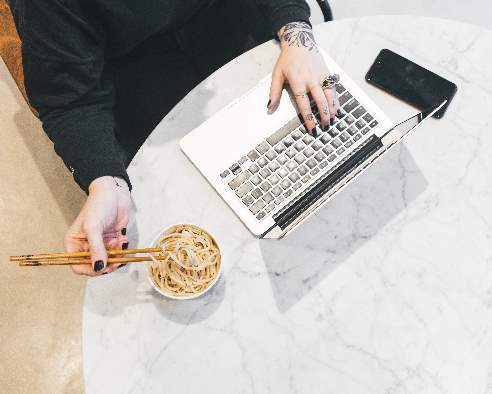Reading time: About 3 minutes
Today’s column tackles the controversial topic of multitasking. Is it the sign of a highly skilled writer or a totally delusional one? Read on to find out.
I work mostly from home and I’m the mother of triplets. In some ways, I think I’m a marvelous multitasker. Heck, I practically defined the term. When my kids were small, I could feed two babies, change the diaper on the third, talk on the phone and plan dinner, all at the same time. So please take me seriously when I say I know multitasking. But when it comes to writing, I think it’s a bad idea.
In theory, multitasking sounds brave and competent. Truth be told, however, it’s more accurate to describe multitasking as “being distracted.” Scoff if you like, but I think writing is a bit like driving; it requires your full attention. To get a more visceral understanding of what this means, you might want to play a brief online game dreamed up by the New York Times.
Working from the principle that many people mistakenly think they’re pretty good at multitasking while driving, the game sets out to measure your reaction time when distracted. How does it work? Well, it puts you behind the wheel of an imaginary car and asks you to change lanes — repeatedly and quickly. Then, it sends you text messages, which you’re expected to answer. (And if your answers have too many errors, you get a text message saying “Sorry, I can’t understand you!”)
After you’ve responded to three text messages, the game then sends you a score. Average reaction times show that most players are .24 seconds slower at changing lanes while texting and miss 8% more gates. (Confession: I did much worse than that!) Try it yourself!
So how does this principle apply to writing? I think there are five main ways in which writers try to multitask (and I suggest you avoid ALL of them while you’re writing.)
1) Checking email. This is probably the most disruptive — and compelling — distraction of our day. According to a calculation by Merlin Mann on his website 43 folders, if you check your e-mail every 5 minutes, then you’re checking it 12 times an hour. Multiply 12 times an hour by 8 hours a day, 5 days a week, 50 weeks a year (assuming you take two weeks of vacation and not counting your at-home email habits) and that means you are checking your email some 24,000 times each year. That’s awesome — in a bad way! As Mann asks: “What are you not working on during that time?”
2) Surfing the web. How often are you checking Facebook, Twitter, blogs or just generally surfing the web? Sure it’s attractive (I adore Twitter for example), but I don’t let it control my life. All computer related habits should be delegated to set times of the day. Start by trying to limit yourself to once an hour for each. From there, reduce even further to only once or twice a day. Or, possibly, use this “distraction” as a reward for when you finish your writing.
3) Talking on the phone. Here’s a hard one. Not only can it be fun, it can also be essential for your job. If there’s a call, you can’t afford to miss, it takes nerves of steel to ignore a ringing phone. To solve this problem, try to schedule your writing as an appointment — and then treat it like a meeting with your CEO. If necessary, leave your office and perch in a coffee shop or at a boardroom or library table.
4) Doing research while you write. Please, don’t ever mix your writing with your research. These are two separate tasks and the research should always come first. That doesn’t mean there won’t be information gaps when you write but don’t use them as an excuse to stop writing. Instead, insert a blank “marker” in your text — like this ________ or this XXX — and then research how to fill it/fix it later, when you’re editing.
5) Eating. I see a lot of people eating lunch at their computers. This is a bad idea — not just for you, but also for your computer. Crumbs and liquid can kill your keyboard. My daughter lost her laptop when she spilled a glass of orange juice over it. But it’s also bad for you. When you’ve been working hard writing, you deserve a break. So, pat yourself on the back and go eat your lunch (or your snack) elsewhere.
Multitasking. It’s not just being an extra-hard worker. It’s being a distracted one.


